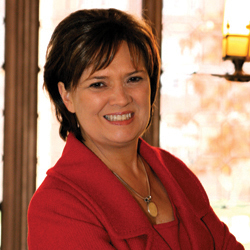Lynn Pasquerella is the President of Mount Holyoke College, the first institution in the U.S. to grant women college degrees. President Pasquerella is a 1980 Phi Beta Kappa, magna cum laude graduate of Mount Holyoke College and earned her Ph.D. in Philosophy in 1985 from Brown University.
Q: What does entrepreneurship mean to you, and what underlying characteristics do you see in successful entrepreneurs?
Lynn: Entrepreneurship is promoting business, industry, and the social good through innovation. I am particularly excited about Mount Holyoke's creation of makerspaces on campus and in the Valley as a means of promoting entrepreneurship and creating pathways for girls and women in STEM through increased visibility around applied liberal learning.
Q: What are you most proud of in your professional career?
Lynn: Throughout my career, I have demonstrated a deep and abiding commitment to liberal education, to access to excellence in higher education regardless of socioeconomic background, and to political scientist Benjamin Barber's notion of colleges and universities as civic missions. I am proud of the fact that I have been able to enact these values through service as the eighteenth president of Mount Holyoke College, an institution that transformed my life, and by outreach in the public humanities as a teacher, radio and television host, medical ethicist, and prisoners' rights advocate around the globe.
Q: Tell us about an instance where you had to go against the flow to realize your goal.
Lynn: Much of my academic career has involved going against the flow. Only 16% of professional philosophers are women, and women represent only 26% of college and university presidents. Women often risk the scorn of their peers by taking on leadership roles without conforming to authoritarian, patriarchal structures. I am steadfast in my commitment to authentic leadership, collaboration, and cooperation as a means of achieving institutional objectives.
Q: What advice would you give women who worry about whether women can have it all?
Lynn: Most discussions of "having it all" center on balancing work and children, but that definition of "all" is incomplete. Women are more than two-dimensional humans. Women also want to spend time on other aspects of their lives: art, politics, faith, experiencing the natural world. Left to pursue only two dimensions of our lives leaves other parts of who we are under-cultivated.
- We need to be mindful of who is left out in conversations of women and work/life balance. The argument is largely framed in terms of balancing work and child rearing responsibilities. Many women chose not to have or cannot have children. Yet, seeking a balance in their lives between work and personal obligations and interests is equally important.
Q: LinkedIn style - If you were to give advice to your 22 year old self, what would it be?
Lynn: Be yourself, follow your passions, remember where you came from, take some risks, and hang on--the best is yet to come!
Follow Lynn Pasquerella at @Commish1837, and check out the other interviews in Going Against the Flow series at http://www.huffingtonpost.com/charu-sharma/ or goagainsttheflow.com.

